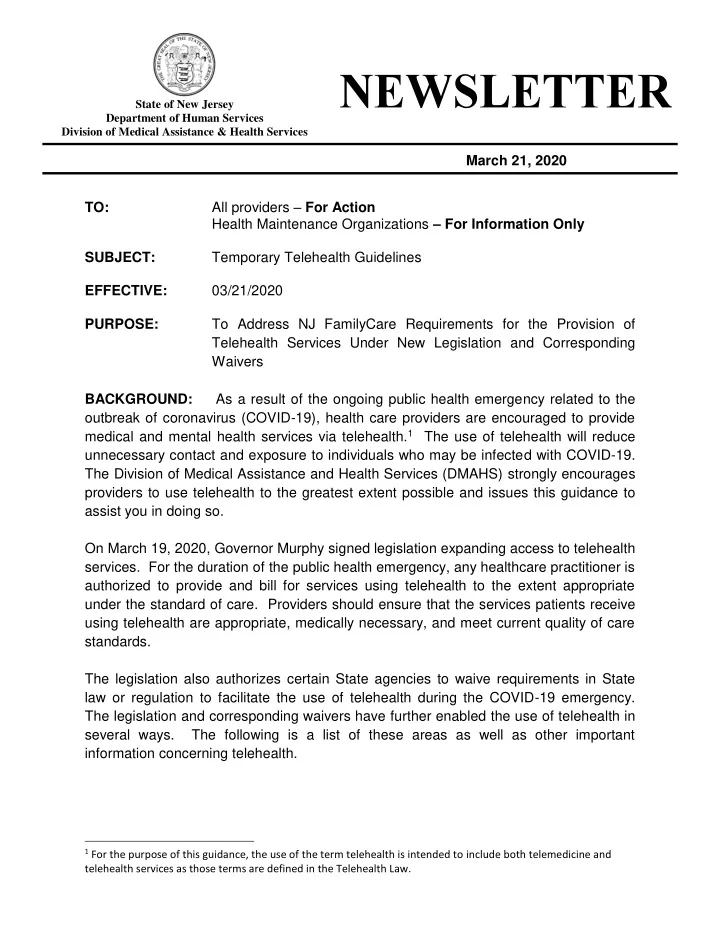

State of New Jersey Department of Human Services Division of Medical Assistance & Health Services March 21, 2020 All providers – For Action TO: Health Maintenance Organizations – For Information Only SUBJECT: Temporary Telehealth Guidelines EFFECTIVE: 03/21/2020 PURPOSE: To Address NJ FamilyCare Requirements for the Provision of Telehealth Services Under New Legislation and Corresponding Waivers BACKGROUND: As a result of the ongoing public health emergency related to the outbreak of coronavirus (COVID-19), health care providers are encouraged to provide medical and mental health services via telehealth. 1 The use of telehealth will reduce unnecessary contact and exposure to individuals who may be infected with COVID-19. The Division of Medical Assistance and Health Services (DMAHS) strongly encourages providers to use telehealth to the greatest extent possible and issues this guidance to assist you in doing so. On March 19, 2020, Governor Murphy signed legislation expanding access to telehealth services. For the duration of the public health emergency, any healthcare practitioner is authorized to provide and bill for services using telehealth to the extent appropriate under the standard of care. Providers should ensure that the services patients receive using telehealth are appropriate, medically necessary, and meet current quality of care standards. The legislation also authorizes certain State agencies to waive requirements in State law or regulation to facilitate the use of telehealth during the COVID-19 emergency. The legislation and corresponding waivers have further enabled the use of telehealth in several ways. The following is a list of these areas as well as other important information concerning telehealth. 1 For the purpose of this guidance, the use of the term telehealth is intended to include both telemedicine and telehealth services as those terms are defined in the Telehealth Law.
Provider-Patient Location The State has waived any site of service requirements to allow licensed clinicians to provide telehealth from any location and individuals to receive services via telehealth at any location. In a September 2018 Newsletter (Vol.28 No. 17), DMAHS issued guidance concerning instances where telehealth services are provided through an entity which is licensed at a specific address, such as an independent clinic. DMAHS advised that the patient must be physically present at the licensed address for those services to be billable by the clinic. This previous guidance is suspended. An entity that is licensed at a specific address may bill for telehealth services when the patient and/or provider is engaging in these services from a remote location. To be clear, under no circumstances will a patient or provider need to go to a specific location to engage in telehealth. Technological Devices State laws imposed limitations on the types of communication devices that could be used for the delivery of telehealth. The new legislation and waivers remove these restrictions for the duration of the public health emergency. Providers are permitted to use alternative technologies for telehealth such as an audio only telephone or video technology commonly available on smart phones and other devices. Providers now have the flexibility to use all available and appropriate technological devices to offer telehealth as long as these services meet standard of care. HIPAA Along these same lines, the federal government has relaxed HIPAA restrictions on the use of technological devices in telehealth. The USDHHS Office of Civil Rights (OCR), which enforces HIPAA, has advised that it will exercise its enforcement discretion and not impose penalties for noncompliance with HIPAA rules against providers in connection with the good faith provision of telehealth during the COVID-19 emergency. This action affords providers more flexibility in the technology they use to engage in telehealth. Providers are responsible for complying with HIPAA and implementing OCR’s noti fication, which is available at https://www.hhs.gov/hipaa/for- professionals/special-topics/emergency-preparedness/notification-enforcement- discretion-telehealth/index.html. Establishing a Provider/Patient Relationship The State’s telehealth laws require a provider t o establish a proper provider-patient relationship to engage in telehealth. While a provider and patient must exchange certain identifying information to establish such a relationship, a provider is no longer required to review a patient’s medical history and medical records prior to an initial
telehealth encounter. Providers should use clinical judgment to obtain relevant medical history and review medical records available to meet applicable standards of care, but the unavailability of records is not a barrier to the establishment of provider/patient relationship during the declared state of emergency. Federally Qualified Health Centers Face-to-face and related requirements for FQHCs are waived. DMAHS will allow FQHCs to be reimbursed at their ordinary Medicaid rate for the provision of telehealth services. Licensure and Out-of-State Providers The new legislation and waivers allow professional and occupational licensing boards to expedite licensure of out-of-state professionals during the public health emergency. An individual applying for a specific license, certificate of registration or certification in New Jersey must have a corresponding license, certificate of registration or certification in another state to be eligible for expedited licensure. The legislation gives the Director of Consumer Affairs and the applicable licensing board the ability to temporarily waive licensing fees and certain licensing requirements. Telehealth service provisions are limited to those services within a provider’s current scope of practice and, when applicable, current licensure unless a separate a waiver is issued. Billing Procedures Health care providers may bill for any Medicaid billable service using the same billing codes and rates that are provided for face-to-face services. There is no need to use any additional procedure codes or additional modifiers. The use of GT suggested in the original pilot has been discontinued by the Centers for Medicare and Medicaid Services (CMS) and is not necessary for billing. If there are any questions regarding the information listed in this Newsletter, please contact The Office of Customer Service at 609-631-4642. RETAIN THIS NEWSLETTER FOR FUTURE REFERENCE
Recommend
More recommend